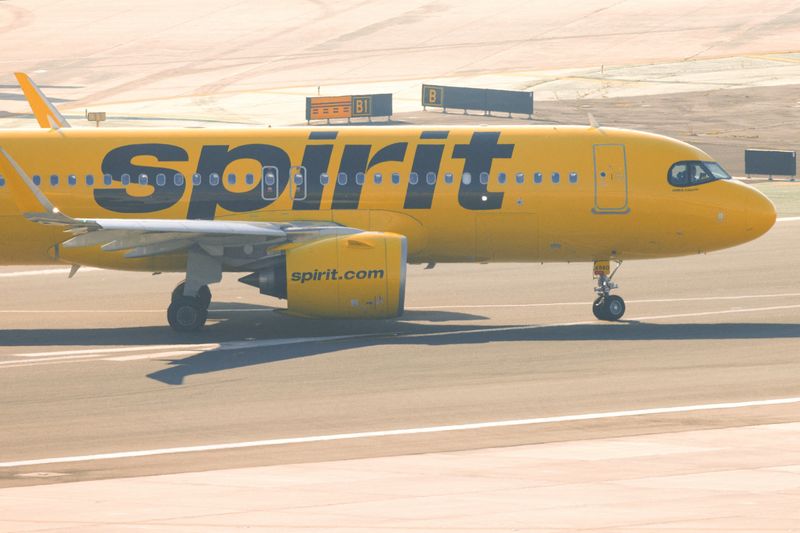Spirit Airlines extends slide as blocking of JetBlue merger fuels uncertainty By Reuters
[ad_1]

© Reuters. FILE PHOTO: A Spirit Airlines aircraft prepares to depart San Diego International Airport in San Diego, California, U.S., January 16, 2024 after a federal judge on Tuesday blocked JetBlue Airways’ planned $3.8 billion acquisition of ultra-low-cost carrier
2/2
By Shivansh Tiwary
(Reuters) -Shares of ultra-low-cost carrier Spirit Airlines (NYSE:) fell 17% in morning trade on Wednesday, a day after a U.S. judge blocked the airline’s planned $3.8 billion merger with rival JetBlue Airways (NASDAQ:).
Spirit’s stock shed nearly half of its market value on Tuesday after a federal judge agreed with the U.S. Department of Justice that the airline’s deal with JetBlue would harm ticket buyers. The decision has left the company in limbo, with analysts saying it could seek out another buyer or consider a bankruptcy filing.
Spirit has had a hard time remaining profitable due to increased operating expenses and ongoing supply chain problems, raising concerns about the company’s ability to repay its remaining debt due to mature next year.
Some analysts said the company might contemplate a bankruptcy filing to streamline its balance sheet and reorganize into a financially robust airline.
The best-case scenario for Spirit would be a Chapter 11 filing, followed by a liquidation (Chapter 7), according to TD Cowen analyst Helane Becker.
Each airline now seems to face crucial strategic and financial decisions, Citi analyst Stephen Trent wrote in a note while maintaining neutral ratings on both stocks.
A deal with JetBlue would have created the fifth-largest carrier in the U.S. and would have been a shot in the arm for Spirit.
JetBlue shares, which closed 5% higher on Tuesday, were also down 6.2% in morning trade.
“We now see a very, very low probability of the merger being consummated,” Deutsche Bank analysts wrote in a note citing regulatory hurdles, even if the carriers decide to appeal.
Spirit has been among those airlines hardest hit by an issue with RTX’s Pratt & Whitney Geared Turbofan (GTF) engines, resulting in the grounding of several of its jets and which is only expected to increase in 2024.
Excess capacity in some of its key markets is hurting Spirit’s pricing power too, forcing the company to indulge in steep discounting to sell enough seats, making the road to recovery bumpy.
“We see little valuation support for Spirit in the absence of a merger,” J.P.Morgan equity analyst Jamie Baker said.
Spirit’s ratio of enterprise value to sales for the next 12 months is 1.3, compared to 0.6 for suitor JetBlue, as per LSEG data. A low ratio implies a more attractive investment opportunity.
The airlines can appeal the ruling. In a joint statement, JetBlue and Spirit said they were evaluating “next steps as part of the legal process.”
[ad_2]
Source link

© Reuters. FILE PHOTO: A Spirit Airlines aircraft prepares to depart San Diego International Airport in San Diego, California, U.S., January 16, 2024 after a federal judge on Tuesday blocked JetBlue Airways’ planned $3.8 billion acquisition of ultra-low-cost carrier
2/2
By Shivansh Tiwary
(Reuters) -Shares of ultra-low-cost carrier Spirit Airlines (NYSE:) fell 17% in morning trade on Wednesday, a day after a U.S. judge blocked the airline’s planned $3.8 billion merger with rival JetBlue Airways (NASDAQ:).
Spirit’s stock shed nearly half of its market value on Tuesday after a federal judge agreed with the U.S. Department of Justice that the airline’s deal with JetBlue would harm ticket buyers. The decision has left the company in limbo, with analysts saying it could seek out another buyer or consider a bankruptcy filing.
Spirit has had a hard time remaining profitable due to increased operating expenses and ongoing supply chain problems, raising concerns about the company’s ability to repay its remaining debt due to mature next year.
Some analysts said the company might contemplate a bankruptcy filing to streamline its balance sheet and reorganize into a financially robust airline.
The best-case scenario for Spirit would be a Chapter 11 filing, followed by a liquidation (Chapter 7), according to TD Cowen analyst Helane Becker.
Each airline now seems to face crucial strategic and financial decisions, Citi analyst Stephen Trent wrote in a note while maintaining neutral ratings on both stocks.
A deal with JetBlue would have created the fifth-largest carrier in the U.S. and would have been a shot in the arm for Spirit.
JetBlue shares, which closed 5% higher on Tuesday, were also down 6.2% in morning trade.
“We now see a very, very low probability of the merger being consummated,” Deutsche Bank analysts wrote in a note citing regulatory hurdles, even if the carriers decide to appeal.
Spirit has been among those airlines hardest hit by an issue with RTX’s Pratt & Whitney Geared Turbofan (GTF) engines, resulting in the grounding of several of its jets and which is only expected to increase in 2024.
Excess capacity in some of its key markets is hurting Spirit’s pricing power too, forcing the company to indulge in steep discounting to sell enough seats, making the road to recovery bumpy.
“We see little valuation support for Spirit in the absence of a merger,” J.P.Morgan equity analyst Jamie Baker said.
Spirit’s ratio of enterprise value to sales for the next 12 months is 1.3, compared to 0.6 for suitor JetBlue, as per LSEG data. A low ratio implies a more attractive investment opportunity.
The airlines can appeal the ruling. In a joint statement, JetBlue and Spirit said they were evaluating “next steps as part of the legal process.”